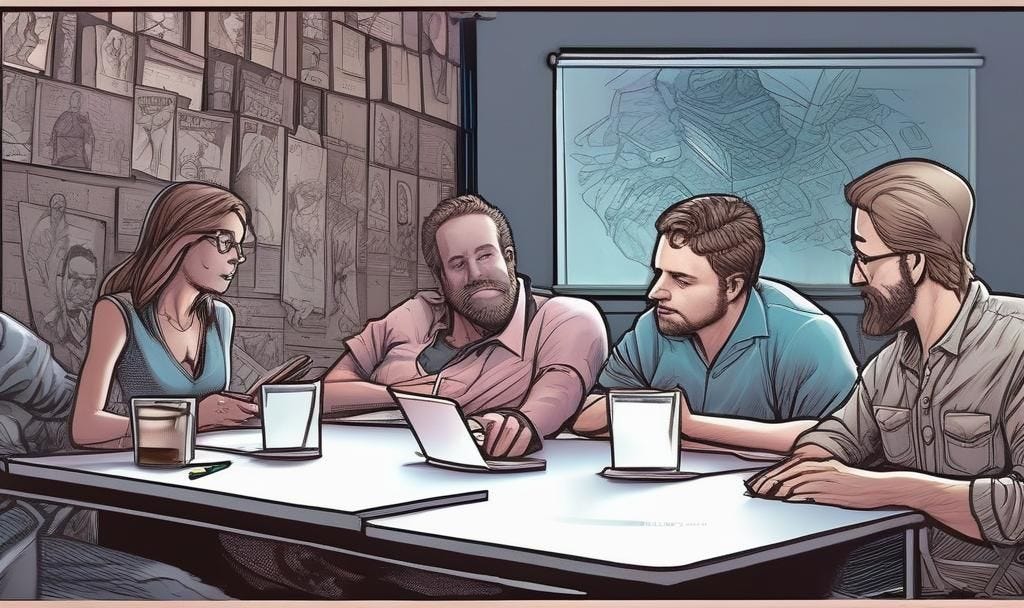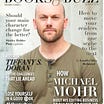The Dullness and Falseness of Writing Conferences
Wading Through the Chaos of "Being a Writer"
All my life, really, I’ve in a sense “been a writer.”
Let me explain.
My mom was (and is) a writer. She studied English Lit in college, briefly, before she got pregnant at 19 with my older half-sister and switched to nursing school. But later, she wrote for a national magazine for many years and later published short stories and three books.
Growing up I had the advantage of my mother’s vast, epic library, full of classic literature. She read to me from these at night. By eight I was writing poems. By twelve I was obsessed with reading when not BMXing jumps, skateboarding or surfing.
Even in the chaos of my anarchic high school years—punk rock, alcohol, tattoos, arrests, high school expulsion and tons of drama—I read, back then books like 1984, Brave New World, Catcher in the Rye, etc.
But it wasn’t until I got sober at the age of 27—the fall of 2010—that I started taking writing seriously. Almost instantly—not drinking for the first time in what felt like forever and brimming with manic creative energy—I finished the first draft of my autobiographical novel about high school (at the time really more like thinly-veiled memoir) which later was published as The Crew.
But I didn’t know what I was doing. Since 2008 I’d been living in the Bay Area. I remember thinking back then, How does one actually ‘become’ a writer? I thought two obvious things: College and writing conferences. And so, in 2012, at the overripe age of 29, I transferred to San Francisco State University (I had enough credits after 11 years and seven different community colleges; no, I’m not kidding or exaggerating) and by summer of 2013 I had my BA in creative writing.
Then, I thought: The MFA. I applied for it at S.F. State, filled all the paperwork out, got the endorsements, did the writing samples, and got accepted. But, just weeks before starting the program I thought better of it and decided against it. I rejected the MFA. Why did I need an MFA? Hadn’t most serious 19th and 20th century authors just written? Hemingway hadn’t even gone to college. Fitzgerald dropped out. Ditto Kerouac. Dostoevsky learned to write from his prison experience. Maya Angelou didn’t go to college. Even George-freaking-Orwell didn’t go to college.
So instead I focused on writing conferences. My first was The San Francisco Writers Conference up on Nob Hill at a massive, fancy hotel in winter of 2013. I was 30 years old. The conference felt wooden, inauthentic to me. All my life—my blessing and my curse—I’d been one of those exhausting “intense” young men, who wanted to go deep right away and never even get close to the surface polish of things. I hated small-talk.
But I quickly learned that these conferences—which cost damn near $1,000 for three days—were all about small talk. This alone drained me. It excited me that literary agents were roaming around, like sharks swimming scarily past little schools of tuna. Literary agents: Those young white women (mostly) who had the power to change your life. They could take your manuscript and sell it to a major publisher, getting you money, book deals, notoriety and sometimes even fame.
But this never happened to me. Instead, I met endless wannabe writers—mostly older retired white Boomer women who were certain they’d written the next Harry Potter and were certain their “incredible” story was the “next big memoir”—engaged in endless chatter and pointless small talk, was constantly rejected by agents, and felt like I was living someone else’s life as I sat down with strangers and ate fancy food from a fancy restaurant in a fancy hotel.
Sure, I met some other interesting writers. Sure, I made some “connections.” Sure, I got some book editing clients (I’d started doing that in 2013) and sure, I met and befriended a literary agent who didn’t offer me representation but asked me to intern for her, which I did for nine months.
There was a decidedly “car salesman” vibe at these conferences. I remember doing the Agent Pitch Sessions, wherein a bunch of we attendees would sit down across the table from agents and pitch our books and then, two or three minutes later, when a bell gonged, we’d move to the next agent. Sure, some agents “requested” pages of my YA novel (some even the full manuscript), but it always turned into a physical or digital polite rote rejection months later, far after I’d forgotten who the agent even was.
There were some good classes, I admit, especially about the industry, the business side of Publishing. I took many of these classes and learned a lot. From 2013 to about 2018 I attended many conferences around the country and even outside of it: New York City, Portland, Oregon, San Diego, San Francisco, Surrey, B.C. Canada, etc. In those five years I attended a dozen or so conferences. I saw a lot of the same faces, the same invited and paid authors, the same literary agents, many of the same attendees. I befriended some of these people; got to know them.
At the Southern California Writers Conference I even started teaching my own writing class and joined in the after-hours private circle of NYC literary agents who’d flown in from Manhattan.
Yet I just couldn’t escape the multiple layers of bullshit which couldn’t be removed from my intuition.
For one, again, it was the cheap car-salesman feeling, like everyone was trying to get something from you. The agents lied and pretended they wanted your book. The hotel tried to get you to spend more money, stay more nights. Every class wanted you to buy their companion text or book. Every author encouraged you to purchase their new bestseller. Between classes booths were set up: Literary materials, tech, pens, journals and everything else for sale. I began to feel like a product being torn apart by the nasty vagaries of literary capitalism. I was a pawn, a clown, a fool, an idiot, a consumer. Just as I’d realized the MFA was a financial scam, I now realized writing conferences were, too.
And that was the bigger problem, the wider aperture: Contemporary times had falsely tried to create a writing “community,” a “literary citizenship,” a “literary capitalism,” a sort of post-modern brand that made you “a writer.” But, on the deepest, most raw, alive and intuitive level, I sniffed bullshit. There was no guidebook for “being” a writer. It’s not like there was some specific, trendy mold one could follow and suddenly poof, there you were, a writer, a penner of prose. True writers were artists in the broadest sense of the word. They weren’t running around chasing conferences and MFAs, they were sitting down and writing. I’d never liked or trusted money. Now was no different.
But there was also another crevice through which I peered into this world with increasingly pompous disdain. I’d noticed two things when talking with or pitching to literary agents at these pitch sessions. The first was that they seemed much more interested in the commercial side of things (which made sense of course) but to the point where they said things like, YA has a certain, specific voice. What? Why would you want any genre to have one specific voice? Isn’t the whole point the uniqueness of each author’s individual voice?
So there seemed to be a sort of new standard which shifted away from art and individualism and towards conformity and commercialism.
But worse: I got too many side-glances, frowns and dismissals for my YA novel because—and they didn’t say this directly but I easily intuited it—it was a story from the year 2000 about (gasp!!) a White Straight Male. Not only that (double-gasp!!) a WSM from the upper class. Ewwww: Gross, right?
I could feel these young white women’s disdain for the kind of book I’d produced. Did it have any feminist elements?, they wanted to know. Does the narrator/protagonist feel empathy for any non-white characters? Why did it have to be in the year 2000; couldn’t it be set now, in 2015, 2016, 2017? (It was autobiographical fiction and this would have totally ruined the structure.) In 2016 and 2017 I started getting the uncomfortable chair-shifting with the sigh and a, Well you know, Trump is in power, I just don’t know if there’s an audience for the traditional SWM story right now…
It would have been the same in any MFA program, too. Thus I realized I was fucked, at least traditionally. Even when I had my YA novel edited by a former Random House acquisitions editor over the course of eight months, and she said it was solid and saleable, and even after having dozens of agents read the full book—including one agent who read the bookall the way through three times and sent me glowing emails only later to dropoff the face of the Earth—I still couldn’t get my novel represented. (By then I’d written half a dozen books, all unpublished.)
So I gave it a rest. I stopped going to conferences in early 2018. I was about 35. I just didn’t have the energy anymore for the constant trying. And I saw very clearly what direction the industry was moving in, and in all areas: Agents, publishers, conferences, MFAs, bookstores, literary culture. It was all becoming more and more homogenous, less and less diverse (ironically) even as technically more non-white people squirmed into the industry and got their books out into the world. The thinking in the literary industry became more and more linear and rigid, more and more locked-in. And I felt more and more locked out.
But that was fine by me, really. My literary heroes—Kerouac, Bellow, Nabokov, Didion, Mailer, Baldwin, etc—had always been rebels, loners, people in many ways outside the conventional norms. And that felt right to me. That’s what writers were: Outsiders. And yet writing, in the twenty-first century, had become “cool,” trendy and myopic, captured by ideology and swimming in financial incentives. A new generation was taking over, and they were mostly white, mostly women, mostly feminist, mostly progressive politically.
And so, in order to be myself—in order to be a writer—I excused myself from all that. I went my own way. I allowed myself to fully be myself. I went the self-publishing direction, and the Substack direction and that has made all the difference. The path less taken, right? Writers have always been transgressive; they’ve always been the weirdos, freaks, spiritual anthropologists mining and observing human experience and behavior. Consider how many crucial writers would have been rejected in today’s climate? Surely Dostoevsky, Bukowski, Hemingway, even Joan Didion who once wrote a searing essay criticizingthe 1970s women’s movement, even calling it “Marxist.”
Be true to thy self, they say. You can’t do that while following the rules, especially when the rules seem arbitrary and culturally fascistic.
And so I walk my own trail.
Michael Mohr writes Michael Mohr’s Sincere American Writing on Substack.







Thanks so much for posting :))
They're also prohibitively expensive. A few months ago one was held just four hours away from me (a very short drive in the west), but it was almost $300 for a basic entry. This doesn't include room and etc.
Why would I spend that money at a place where'd I be miserable and pushed to the side knowing I'd never make any connections? My local group is much more coherent and cohesive, and I like them and don't feel left out.